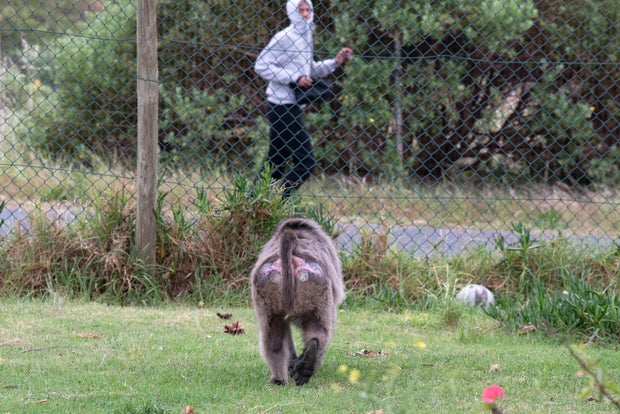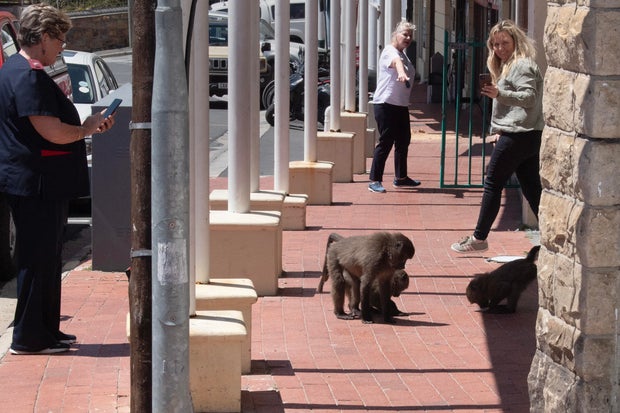Johannesburg — It was a normal holiday morning. My family was getting up for the day and my husband had just left for a meeting. I was holding one of my children in my arms and another by the hand when I saw the front door handle turn and open in a quick gliding motion. I assumed it was my husband who had forgotten something.
Instead, I turned and was shocked to see Split Lip, the alpha male baboon from the troop that was frequenting Misty Cliffs, a small beachside town on South Africa's far southern Atlantic coast, just south of Cape Town.
The baboon jumped onto the nearby kitchen counter, picking up a glass bottle and swinging it in my direction as he opened kitchen drawers below him with his other hand, maybe looking for food. Instead he found a large bread knife, which he waved around his head with the bottle in his other hand, snarling at me and my kids.
It was absolutely terrifying — a sort of Stephen King-meets-ET moment playing out on the kitchen counter of our vacation house.
 A man jogs past as a chacma baboon forages in the garden of a home in a suburban neighborhood of Da Game Park, near Simon's Town, outside of Cape Town, South Africa, Oct. 31, 2024.
RODGER BOSCH/AFP/Getty
A man jogs past as a chacma baboon forages in the garden of a home in a suburban neighborhood of Da Game Park, near Simon's Town, outside of Cape Town, South Africa, Oct. 31, 2024.
RODGER BOSCH/AFP/Getty
I ran downstairs with my kids and locked them in a bedroom, then came back up to call security. The terrifying 43-minute experience ended with me holding a bedroom door closed as he, having devoured the contents of our kitchen, jumped down the stairs scratching his nails on the walls before pulling on the other side of the door.
The security company arrived, and I heard a zapping noise as Split Lip, who had tried to run back up the stairs past the security team in their flak jackets, encountered the team with what looked like a cattle prod.
That was many years ago, but the terror of those 43 minutes remains etched in my family's memory. That baboon troop was moved soon after to the Cape Point national park. But the conflict between humans and baboons around Cape Town remains just as alarming, and things are getting worse, not better.
Social media channels are full of clips showing incredibly brazen baboons waltzing into stores in the popular tourist destination of Simon's Town, stealing fruit and then sitting on roads eating the spoils of their foraging, carefree as they hold up traffic.
Some very aggressive baboons no longer appear to fear humans at all. In the nearby town of Kommetjie, as more and more homes go up and their natural habitat shrinks, baboons came into direct conflict with the locals in October.
Local social media groups update residents on the whereabouts of the baboon troop — roughly 40 of them — and users say the often-tense encounters are escalating.
In 2001, the Urban Baboon Program was launched, and eight years later it was funded by Cape Town's city administration. The baboon management and monitoring partnership, working in conjunction with parks authorities, worked very well for more than a decade.
Transponders were attached to baboons so the troops could be tracked and monitored, and local residents could be alerted.
Keeping the system running efficiently became problematic during the COVID-19 pandemic, and the baboons were essentially allowed to run amok. It has never come back into full swing, and facing widespread criticism, authorities have now said the program will remain in place until the end of November, but then be wound down while better solutions are considered.
Cape Town's urban baboon program annual census found there were just over 500 chacma baboons roaming freely south of the city, including some animals weighing almost 90 pounds.
Cleaning up after my family's encounter — which left a mess of food spoils and baboon feces — left one family member quite ill with a parasite called giardia. Baboons are known to carry many diseases.
Animal rights activists argue that humans should learn to live with the apes as they're part of the local ecology. Many residents disagree, saying they fear for their safety. Kids get scared when dogs bark, fearing they're heralding the arrival of a baboon troop.
 People watch baboons on the sidewalk on the main shopping street in Simon's Town, outside Cape Town, South Africa, Oct. 31, 2024.
RODGER BOSCH/AFP/Getty
People watch baboons on the sidewalk on the main shopping street in Simon's Town, outside Cape Town, South Africa, Oct. 31, 2024.
RODGER BOSCH/AFP/Getty
Frustration is mounting, according to Jenni Trethowan, of the local Baboon Matters organization. She's one of four applicants taking the city of Cape Town and parks officials to court demanding a new solution.
"Its not rocket science," she told CBS News. "Over the past 24 years, officials have researched and come up with strategic plans on a way forward in the best interest of the community and the baboons, and none of those plans have been implemented."
Suggested plans include strategic fencing, baboon-proof garbage cans, and more rangers on patrol.
The case will be taken up in court later this week. "If we win, there will be a timeline and accountability [for] implementing all these strategies that have been researched over years," Trethowan said. "But if we lose, it's too difficult to contemplate."
In the troop of 22 apes that Baboon Matters monitors, three baboons have been killed already this month by illegal shooting.
"In the last month, we have seen our highest death rate in the last few years," she said.
As Cape Town gears up for its annual influx of foreign tourists for the holiday season, many locals are hoping the outsiders won't be tempted to feed the baboons.
Regardless, when the tourists all head back home and the new year begins, residents will still be there, likely left to fend for themselves as there's currently no plan in place to deal with the 90-pound monkeys that prowl their neighborhoods.












 English (US) ·
English (US) ·